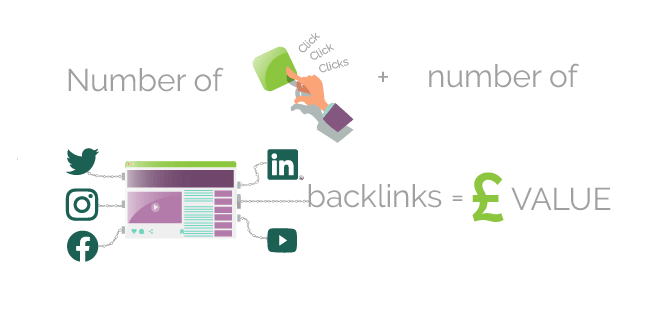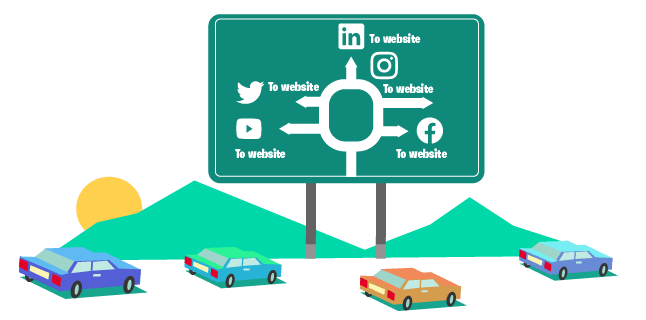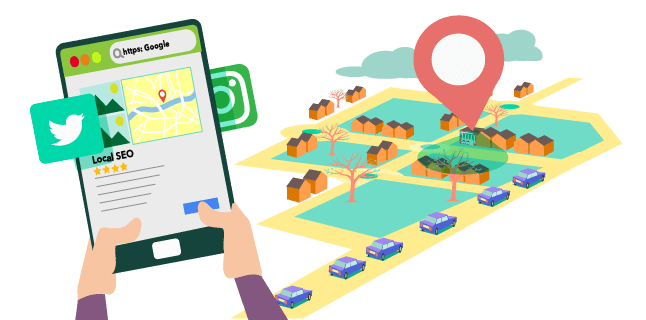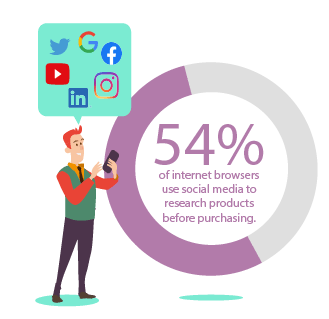Social media has changed everything.
From the way we connect with loved ones to influencing the brands we choose to engage with.
Our social media usage has grown exponentially over the past few years, and isn’t set to slow down yet.
It’s changed the marketplace for the better too. It gives brands the opportunity to connect and share their content with a huge audience of users.
It can take your business global, help to converse with customers 24/7, and increase their trust in your brand. And, when it comes to making sales, this trust is absolutely vital.
In fact, recent research has even found that 54% of internet browsers use social media to research products before purchasing.
Social media is a powerful platform. You can now communicate with your target audience like never before.
But have you ever thought about the impact social media can have away from the platform itself and on your SEO?
Can Social Media Help Your SEO?
The impact of social media on SEO and your rankings has been a hot topic debate for a while.
In short, yes social media can improve your SEO.
But not in the way you might think.
Search engines like Google are highly secretive when it comes to announcing what factors influence their ranking algorithms. Though, they have said in the past that social media isn’t a direct ranking factor.
But, just because Google has announced that it isn’t a ranking factor doesn’t mean that it doesn’t impact your rank.
And, recent research from Searchmetrics has found a high correlation between social signals and a website’s ranking positions.

Why?
Well, content.
We know content which provides value to your visitors tends to rank highly.
And we know that value is determined by two things:
- i) the number of people who clicked on that content
- ii) the number of backlinks a particular piece of content has
Although, social media networks aren’t solely responsible for affecting your rankings. But they can be valuable for increasing clicks, content and links back to your site.
This is because they are key to communicating with audiences which are likely to engage with your content.
And these are all actions that search engines pay close attention to.
Social media networks are a good indicator to search engines of whether the content you produce is quality. Not to mention, where it should rank when people perform a search.
Social media can improve your SEO and the two are intertwined. Thus, social media should form part of your overall digital marketing strategy.

How Social Media Can Improve Your SEO
Although your social media presence isn’t a direct ranking factor for search engines, there are a few ways it can impact your rankings.
1. Increases Site Traffic
Today, the marketplace is highly competitive, so brands must get inventive in order to reach their target audiences online.

Your social media channels are a great place to connect and build your audience. These channels are a chance to show the more informal side of your brand.
You can also use either paid ads or organic, targeted hashtags and pages to reach the individuals who are directly interested in your industry.
Choosing the right platforms to build a presence on is important. However, it’s perhaps more important to produce consistent content that connects with your audience on an emotional level.
The right kind of content
This is content that showcases your brand in a unique and friendly way.
Make sure everything you share on your social media is relevant and up-to-date. This way, you can showcase how much of an authority you are in your field.
Articles, discussion items, and infographics are great pieces of content to share, as they encourage engagement with your brand.
Don’t be afraid to start and engage in a conversation with your audience. Social media will improve your SEO, if you’re creating the right kind of content.
This is because quality content that engages your audience can lead to a strong following on socials. Which in turn, will increase traffic to your website.
And these clicks are inferred by search engines. If they can see that your website is popular and gaining traction in terms of clicks, it’s considered as valuable. This means search engines find your website to be relevant and worth ranking higher.
2. Link Building
Social media sites such as Facebook, Instagram, Twitter and LinkedIn are easy wins in terms of getting backlinks to your site.
Link building has always been and always will be an essential part of SEO, and your social networks can indirectly impact this.
Most social media sites will have designated areas for you to share a URL to your website. This makes it easier for your followers to click through to your site.
You can also include relevant links in your social media posts which will direct your followers to your site, which will also act as backlinks to your site.
For example, if you’re a pet store owner, and you’ve written a great blog post on the best dog food brands in 2020. If you’ve shared a snippet of it on your social media account, you’ll want to include a link back to the original post on your site.
That way, your audience can read the full article and be provided with valuable, relevant content.
High engagement = Quality
If the URLs on your social media have a high engagement rate, this indicates that the content is quality – and search engines like to rank quality content highly.
However, links from social media sites aren’t direct ranking factors. But, they are seen as signals that your content is interesting and engaging to your audience.
Using social networks for link building – that is, sharing content from your site to your social media – will allow users to discover and interact with your content.

If your content is as high quality as it should be, then this could even lead your followers to share and backlink to your site, regardless of the social network.
3. Brand Exposure
Another way that social media can improve your SEO is through brand exposure. Building your brand’s credibility and reputation is a vital part of off-page SEO. Social media is a great tool to help you do this.
Your social networks are the perfect platform to build a voice for your brand. They are an opportunity to show off your unique style, quality content and to reach new audiences.
You can do this organically, by posting to your account regularly. Or, by using paid adverts to target a refined audience who may not have necessarily discovered you themselves through use of brand searching or hashtags.
As long as you’re consistent and authentic in everything you post, your brand’s awareness will increase naturally over time. Your audience will remember who you are, the content you share, and, most importantly, grow to trust your brand.

If you build your brand’s following on social media, it will lead to more searches of your brand. Subsequently, this will lead to more followers that will engage with your content. It will also develop trust around your brand. Trust is valuable, as when a customer wants to make a purchase, they may be inclined to consider your product or service.
Click-through rates have a huge impact on the way search engines rank pages. If you have a high click-through rate across your social media content, you’re likely to rank higher in search too. This is because your pages are likely to be relevant to searcher intent.
Just remember that before using social media to build your brand’s awareness, think carefully about which platform is best suited for your company.
If you’re a small vegan beauty brand trying to target millennials and Gen Z, don’t share your makeup tutorials on LinkedIn!
4. Local SEO
If you’re a business with a local presence, then social networks are a great way of finding and interacting with local customers in your area. And this can enhance your local SEO.
As long as your social media profiles are properly set up and optimised, then these can influence searchers in your local area.

You can use sponsored posts to target a local audience. Or, if you have a lot of local followers, simply share updates or events that encourage them to engage.
If you do have a physical presence in the local area, then it’s essential you build a community with your followers. Share every update and event on your social media so they can join in and get involved in the action.
Always remember – if relevant – to include links back to your website too. This will increase the number of local visitors coming to your site. Which, in turn will alert search engines to the fact that you are a brand with strong relevance in the local area.
Don’t forget the power of local search on mobile
If you’re building a community on your social media, don’t forget to make sure your website is optimised for mobile.
As more and more people conduct their search queries on mobile, local searches are only set to grow. Therefore, you need to make sure your website delivers a great experience for mobile-users.
It’s easy to see if your website is optimised for mobile – just try accessing it through your own smartphone or tablet!
And, it’s also incredibly easy to optimise your site for mobile, and you can do lots of these steps yourself.
Summary
Social media has an indirect relationship with your off-page SEO. It should play a part in the formation of your overall content marketing strategy.
By all means, social media is not a direct ranking factor. That said, social media can improve your SEO, so to ignore it completely would be a huge mistake for your business.
SEO aside for one moment, your social media accounts can have a huge impact on your brand’s visibility. It can help you to build a rapport with customers and encourage them to visit or engage with your site.
This means that whilst social media isn’t vital for SEO, it is vital for content marketing.
Especially as quality content marketing grows as a key factor in ranking higher than your competition. You will need social media to help you rank, if only as an engagement tool.
In this way, social media is really important for SEO. Your social media can increase your site traffic, gain backlinks, and improve your click through rates. Search engines will infer all of this information and index your pages accordingly.
Therefore, you should put the effort into making a comprehensive content marketing plan which includes a supporting social media strategy. That way, you’ll be doing all the right things to build your brand’s online presence and increase your website’s rank.
Using A Marketing Consultancy To Manage Your Social Media
It can take a lot of time to research, develop and implement a strong content marketing strategy. It also requires constant progress monitoring.
To see real results, you need to work at it daily. Engage, converse and adapt your content strategy to suit your audience’s wants and needs.
For smaller companies and start-ups, this time dedication may not be possible. So, outsourcing your social media to a marketing consultant may be the most suitable option for your brand.
My team and I have worked with lots of clients across all sectors to create and implement actionable social media plans. These plans have helped our clients reach a wider audience and increase their overall SEO rankings.
If you’d like to find out more information about the services we can offer, feel free to get in contact today. I’m always happy to have an obligation-free chat and get to know you and your brand.







